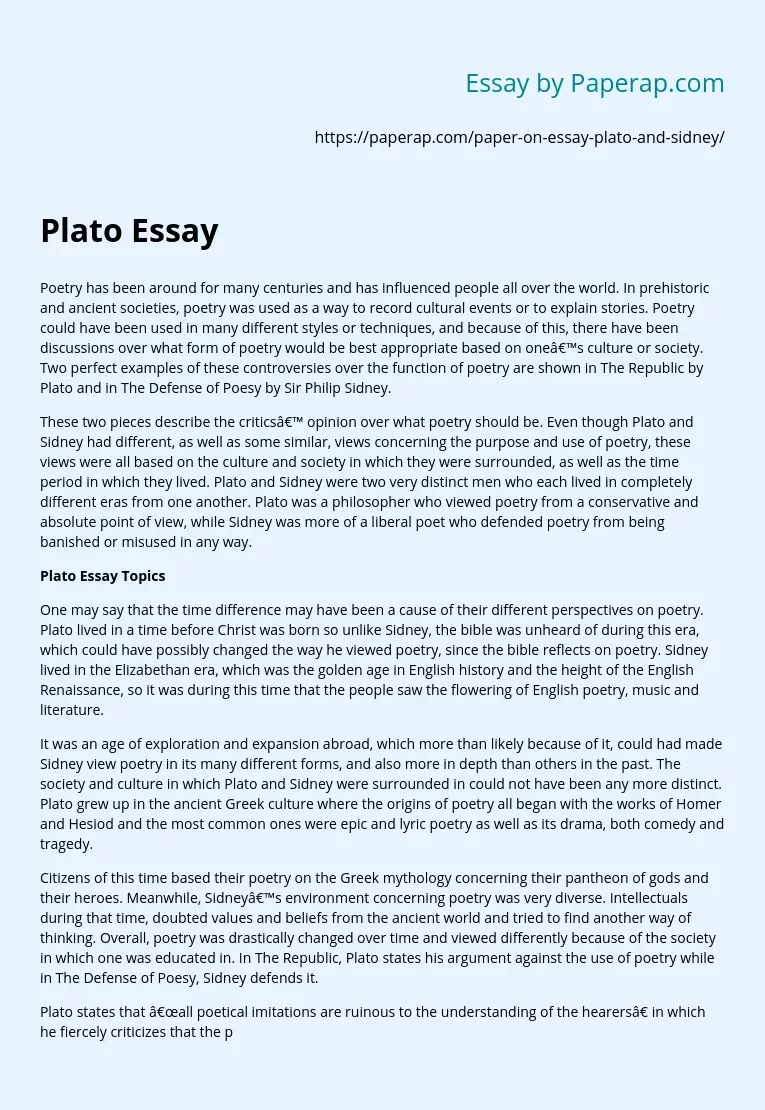The Power of Poetry
Poetry has been around for many centuries and has influenced people all over the world. In prehistoric and ancient societies, poetry was used as a way to record cultural events or to explain stories. Poetry could have been used in many different styles or techniques, and because of this, there have been discussions over what form of poetry would be best appropriate based on one’s culture or society. Two perfect examples of these controversies over the function of poetry are shown in The Republic by Plato and in The Defense of Poesy by Sir Philip Sidney.
These two pieces describe the critics’ opinion over what poetry should be. Even though Plato and Sidney had different, as well as some similar, views concerning the purpose and use of poetry, these views were all based on the culture and society in which they were surrounded, as well as the time period in which they lived. Plato and Sidney were two very distinct men who each lived in completely different eras from one another.
Plato was a philosopher who viewed poetry from a conservative and absolute point of view, while Sidney was more of a liberal poet who defended poetry from being banished or misused in any way.
One may say that the time difference may have been a cause of their different perspectives on poetry. Plato lived in a time before Christ was born so unlike Sidney, the bible was unheard of during this era, which could have possibly changed the way he viewed poetry, since the bible reflects on poetry.
Sidney lived in the Elizabethan era, which was the golden age in English history and the height of the English Renaissance, so it was during this time that the people saw the flowering of English poetry, music and literature.
It was an age of exploration and expansion abroad, which more than likely because of it, could had made Sidney view poetry in its many different forms, and also more in depth than others in the past. The society and culture in which Plato and Sidney were surrounded in could not have been any more distinct. Plato grew up in the ancient Greek culture where the origins of poetry all began with the works of Homer and Hesiod and the most common ones were epic and lyric poetry as well as its drama, both comedy and tragedy.
Citizens of this time based their poetry on the Greek mythology concerning their pantheon of gods and their heroes. Meanwhile, Sidney’s environment concerning poetry was very diverse. Intellectuals during that time, doubted values and beliefs from the ancient world and tried to find another way of thinking. Overall, poetry was drastically changed over time and viewed differently because of the society in which one was educated in. In The Republic, Plato states his argument against the use of poetry while in The Defense of Poesy, Sidney defends it.
Plato states that “all poetical imitations are ruinous to the understanding of the hearers” in which he fiercely criticizes that the poet is ignorant of the things in which he imitates and because of it, poetry addresses itself to the lower qualities of man, with which he cannot grasp the truth (Plato 19). Even though, in his ideal state, a large part of the education of the young is based on the study of certain kinds of poetry such as “hymns to the gods and praises of famous men” (30).
Sidney agrees with poetry being used to educate but primarily addresses more general objections to poetry, such as those of Plato. He states that “Plato found fault that the poets of his time filled the world with wrong opinions of the gods, making light tales of that unspotted essence, and therefore would not have the youth deprayed with such opinions” which meant that Plato was not necessarily against poetry but more against the abuse of it (Sidney 174).
Plato and Sidney both find virtue to be very important, but Sidney also believed that the purpose of poetry was “to teach and delight” (169). Sidney stated that “the poet is the food for the tenderest stomachs; the poet is indeed the right popular philosopher” which meant that it did not require someone to be educated in order for one to understand what the poet was implying in his stories (170).
The essence of Sidney’s defense was that poetry, by combining the liveliness of history with the ethical focus of philosophy, was more effective than either history or philosophy in rousing its readers to virtue. On the other hand, Plato believed that the primary purpose of poetry was to educate alone. He believed that if delight intervened, that the citizens would “be ready to imitate anything, not as a joke, but in right good earnest, and before a large company” which implied that poetry could not be imitated because if done so, one could become what one imitated in real life (Plato 16).
Poetry is an ancient form that has gone through numerous and drastic reinvention. It has come to show that over time, a changing culture has the power to change the meaning of a word. Plato definitely deprives poetry of its freedom while Sidney just wanted to set it free. Today, poetry has a different meaning and function than what it was during Plato’s and Sidney’s time. Poets often borrow styles, techniques, and forms from diverse cultures and languages. The poet can borrow a notion of pictures and create a story and by that use poetry as a tool for educating and to use it as a service to the public, trying to make people better.
The Power of Poetry. (2019, Dec 05). Retrieved from https://paperap.com/paper-on-essay-plato-and-sidney/

